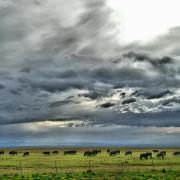Following a sell-out 2022 UK tour, Steve Backshall is back on the road with a love letter to the
most exciting environment on our planet.
Following a sold-out tour in 2022 you are bringing your highly successful ‘Ocean’ live show back to theatres across the UK in 2023 for 23 performances. Are you excited to get back on the road and what should audiences expect.
I am so excited to be back touring the country with my live show “Ocean”. I’m bringing the ocean’s aquatic environments and marine creatures to life on stage by using a giant screen featuring lots of amazing footage from my encounters with sharks, whales and dolphins over the years. There will be on-stage science experiments, by using props, stunts and tricks plus some outtakes and bloopers too. Also, some life-size scale ocean giants that we’ll be bringing out on stage, which I think really helps because it’s very, very difficult to get a sense of how big these animals really are. Being able to replicate that on stage is a big part of the show.
Why did you choose the ocean as your subject?
First of all, the ocean and the animals that live there are my absolute passion. Secondly, it's a part of the world that is a mystery to most people. There are so many of the secrets of the seas that people just don't begin to know anything about. And thirdly, it’s probably the part of our planet that's at the most at risk right now. The show is very much based around the most iconic animals in our oceans and how they function and what makes them special. But I will also be talking a bit about the challenges that they face and that the broader environments in the oceans face as well. All of those things together made it seem that this was the perfect topic for a stage show.
Without too many spoilers, what sort of stunts will you be doing?
I have a bunch of different ways that I'm going to try and illustrate the most out-there elements of wildlife, what it does, and how it works. That is going to involve an awful lot of stunts and tricks and experiments, many of which are going to go horribly wrong because they always do. I’m almost certainly going to end up covered from head to toe in goo at some point. I’ll be working quite hard to not physically hurt myself on stage, which is very, very possible, or even likely to happen.

What are you hoping to achieve with the stunts?
We’ve done quite a lot of this sort of thing on my kids’ television programmes over the years, and I find that it's a really effective way of illustrating an area of animal biology that perhaps otherwise might just be beyond our imagination. The classic would be that I can say 1000 times over that the biggest blue whale ever was 32 metres long and weighed 200 tonnes, but nobody knows what that means. It's not until you actually take a jumbo jet and you saw its wings off, and you say, “right, it's that big, and it weighs that much,” that people get it.
So you want to make this exotic wildlife relatable?
A: Yes. It’s about finding things which are familiar to people and they understand and perhaps they may see in their everyday life that connect to how a jellyfish stings or how the tail of a thresher shark may take down its prey. There is 25 years of experience behind every single one of these tricks. It’s going to be a bit of magic show. It's going to be a bit of TED Talk. It's going to have a fair bit of panto thrown in. I’m very much hoping to make people laugh, and then cry and then think, and then think some more and then laugh again because I have just covered myself in elephant faeces. Actually, probably not elephant faeces because we're underwater, so whale poop!
Can you put into words why the ocean is your very favourite place on the planet?
So many of my very best wildlife experiences have been in the ocean. Whether it's been freediving alongside a female sea lion who is dancing wingtip to fingertip with me underwater, coming in and practically nuzzling my mask as we swim alongside each other and pirouetting underwater like some kind of marine ballerina, through to seeing a tiny flamboyant cuttlefish no bigger than the end of my thumb hunting mysid shrimp on the bottom of the sea before putting on a hypnotic light display that would rival any nightclub in London. And then, having a humpback whale swim alongside you underwater, a big female being chased by 15 males all rocketing along, beating the living daylights out of each other to try and get their girl, or seeing flying fish skimming in front of your boat, or dolphins riding at the bow of your boat as you travel through every sea from Antarctica, to the tropics to the Arctic. The ocean is a place that is full of surprises, full of wonder, always invigorating. And I just want to bring that to life on stage.

Do you have a favourite marine animal?
I think the Orca would be my favourite. There is so much about them that we don't understand, and yet they have an awful lot in common with us. They're obviously an air breathing mammal that breast feeds its young. But they're also an animal that that has culture and language and community, that grieves for its dead and fears for, cares for and educates its young. They're a creature that can be apparently cruel, but also altruistic. There's so much about them that I find fascinating. And I know that I could study them for a lifetime and I still would not really understand them.
How do we know that they grieve for their young?
Because it's been seen and filmed and recorded. Female Orcas have carried their dead calves around with them for four weeks until eventually it's not feasible any longer. And those that have had their calves taken from them, particularly by organisations looking to put them into theme parks, have fought to the death to protect their youngsters and prevent them being taken away from them. So it's not just me anthropomorphizing them. It's pretty evident that they go through those emotions. Obviously you can also test for hormones such as cortisol. Those demonstrate they are undergoing great stress which likewise shows that they grieve in exactly the same way as we do.
You also love sharks. Can you describe the delight of swimming with them?
As much as anything else, it turns our own expectations on their head. “The J Word” – Jaws – has had such an all pervasive effect on the way that people see sharks that so often you get in the water with them and people shout, “oh my god, he's going to get eaten instantly!” That was probably somewhere in the back of my head as well when I started off. But it’s amazing to turn that expectation around and find that not only are sharks not malicious man-eating monsters that are out to get you, but actually they are completely ambivalent to your presence, they could not care less if you're there or not. In the right situation at the right time, with the right Shark, you can swim alongside them, as safely as you would swim alongside a dolphin or seal. Each individual shark will show off the way it’s feeling, whether it’s going into predatory mode or getting territorial, you can see that from the way they look in the water. It’s a question of assessing that. The shark is this streamlined, supercharged predator that's been around for at least 400 million years, which is a masterpiece of evolution. That is quite transfixing and beautiful.
Finally, what sort of audience do you hope will come along to Ocean?
A: It’s pretty important to address who will come. At shows like this in the past, I have had three year olds who are interested in wildlife who've been spellbound. Potentially all they're doing is in enjoying the spectacle and enjoying the beautiful images. And in the same audience, I've had PhD marine biologists who are getting as much out of it as the three year olds. I also have a friend who is a professor of biology, and he will be one of the first people to buy a ticket. So when people ask me, 'who's it for? What age is it suitable for?' I say, 'if you've got kids who are into wildlife, who love sharks, who love whales, who love sea lions, it doesn't matter how old they are, it’s not important – they’ll still love it So I’m doing everything I can to make sure this show includes as many people as possible. I absolutely say, 'if you are an undergraduate in zoology, there's going to be plenty of stuff in there for you. And if you're a toddler who likes sharks, then you're going to love it, too. And you’ll also have the joy of seeing me covered from head to toe in goo!'
stevebackshall.com


























